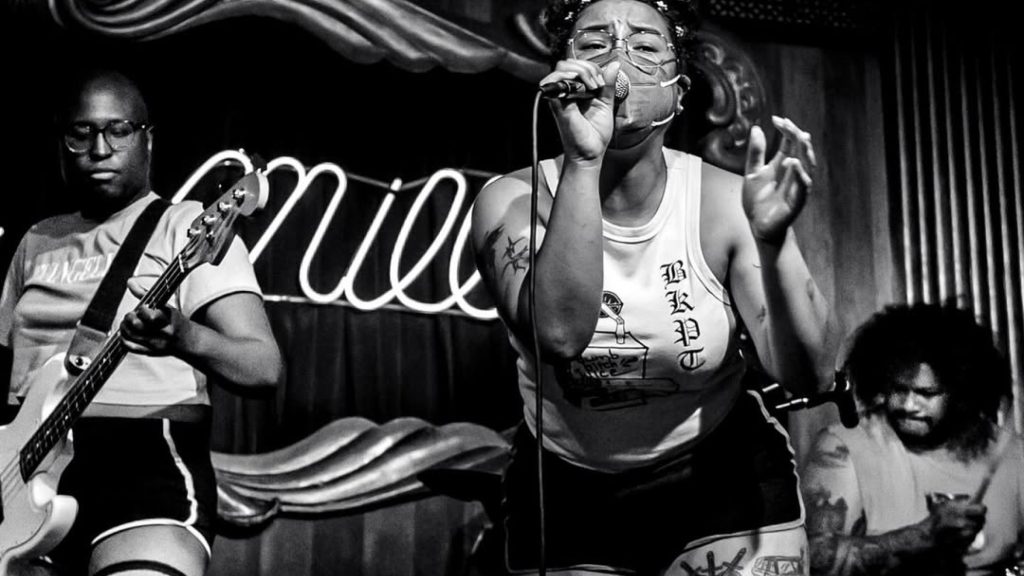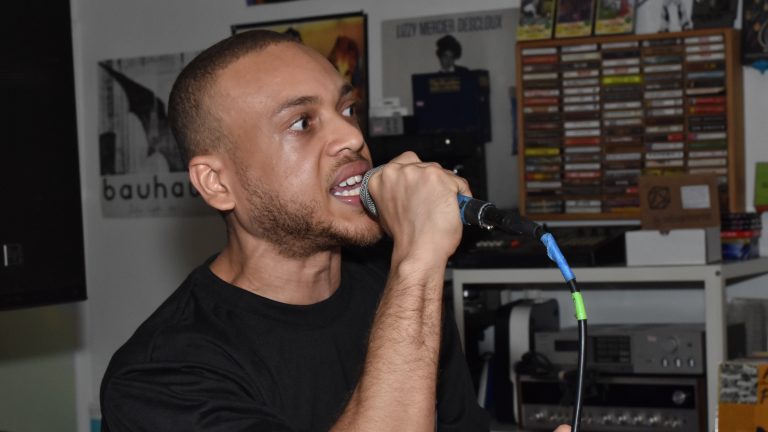When Nina Simone said an artist must “reflect the times,” she certainly did not foresee the times we’re living in right now. From a customized “dictatorship” where everything in America is looking to be dismantled by our current administration to constant genocide, to abusers and cop killers given second chances, it seems like every day we live holds a new calamity aiming to make us cry hard, laugh out loud, or scream bloody murder. So, if we truly need a band to get us through 2025, the least they can do is reflect the ability to have us doing those three things while dealing with mind-twisting levels of stupidity. Enter Chicago sasscore/queercore trio Bussy Kween Power Trip.
Anonymously named after the letters that make the abbreviation of their name—B on vocals, K on bass, and originally PT on drums (now Darien Williams)—Bussy Kween Power Trip sounds like getting swept up in the wild tornado of this sick world faster than you can obey the order to “suck their bussy,” which they have demanded on their standalone single “Like You Should.” The songs emotionally land like a television out of a fifth story hotel window upon an unsuspecting head of an inconspicuous fascist. Coming With The Strap, BKPT’s debut full-length is packed tightly full of punk energy, cutting wit, and a refusal to place itself in any box.
Coming With The Strap discusses various topics, but one recurring thread is the hardships of being a femme. The dizzying nature of “Careful” attacks the useful-on-the-surface warning by B sarcastically singing “be careful where you go, be careful what you do, be careful who you meet,” before shooting back “fuck careful when you know that careful don’t mean shit.” By sniping the empty platitude and sharing how a careful woman died in a man’s car, BKPT further condemns the need for femmes to constantly look over their back when anyone can be the target. The filthy sludge punk of “Internet Graveyard” continues with a story of a chronically online girl who uses chatrooms a lot and gets warned about how such a thing can impact their real life if they meet the wrong one, yet they still eventually meet their fate. Within the lyrics, they speak for the girl by saying the internet is the one place where they feel a sense of validation. “All my friends are on there, and they’re so kind, you see,” sings B as the titular e-girl. “It’s the first time I feel like my peers like me for me.” Validation, desperation, and parasocial dangers due to real-life disconnection are all subjects, and according to such a song, these things unfortunately lead to a death that had less to do with the internet and more to do with service apps.
Even “New Body” is a solid example stepping into the shoes of a person who goes to get plastic surgery only for it to impact their ability to function and live—the last sentiment being unsurprisingly literal. For all this, it is a wonder that “Kill a Man,” whose faux-soft conversations in between are later ended with the fury that would make Retsuko clap for joy, is the first burst of anger in line.
Outside the aforementioned list are straight ahead juggular-puncturing tunes where erasure through cultural appropriation and/or transactional friendships (“No New White Friends”), finding out someone in the music scene is a predator (“Why Would He Do That? IDK He’s Bored”) and even confronting white women who use black men while failing to protect them (“On the List”) become standout points. So much so that these songs have no stories to connect to the message; they are straight-aimed cups of bile. With songs also discussing insidious use of discrimination as a power tool against marginalized communities alongside patriarchal insecurities, BKPT accurately and ruthlessly zeroes in on the ills of our time.
In addition to such fiery punk, Bussy Kween Power Trip isn’t afraid to throw other genres into the kitchen sink. For example, the bass-heavy stomper “Cop Garage” switches from live instruments to a filthy dubstep closer. The surrealist Aristocrats-joke-in-song “Cracker Barrel” swings like a filthy cigarette-stained 2000s garage rock tune gone mad before the second half forces you to burst into laughter via a brief nod to 2000s era R&B. Even “Bootlickers Anonymous” sounds like what would happen if punk busted its way onto the disco to pimpslap the nearest hipster. Nothing is particularly off the table. Such genre hopping feels less like arbitrary hops and more like stylistic tools to drive home said songs’ feelings.
During a time where many regular Americans go “what the fuck?”, it is obvious that the tried-and-true saying of anything isn’t enough to get by anymore. Plenty of punk bands have emerged from these times with as much bite as there are calls to action. But if you want a punk album that accurately sounds tailor-made for this jaw-dropping horror film of a year, look absolutely no further than the Bussy Kween Power Trip’s feral, explosive, and enjoyably unhinged debut, Coming With The Strap.





